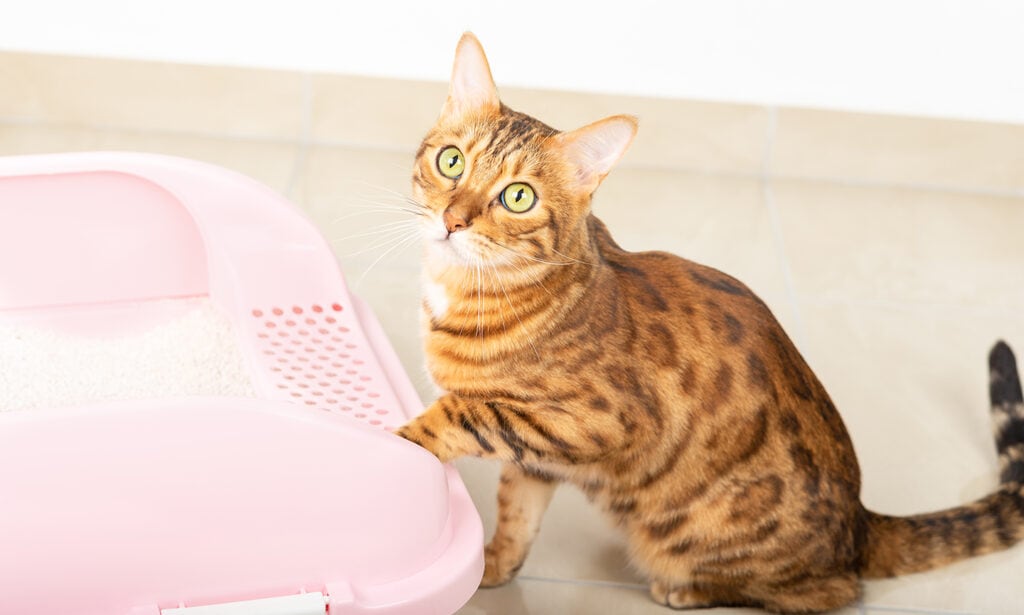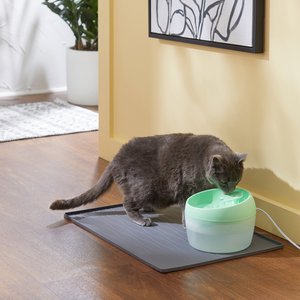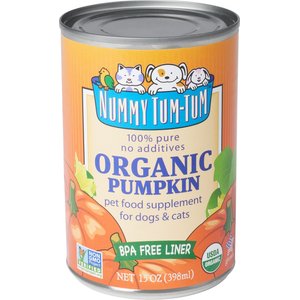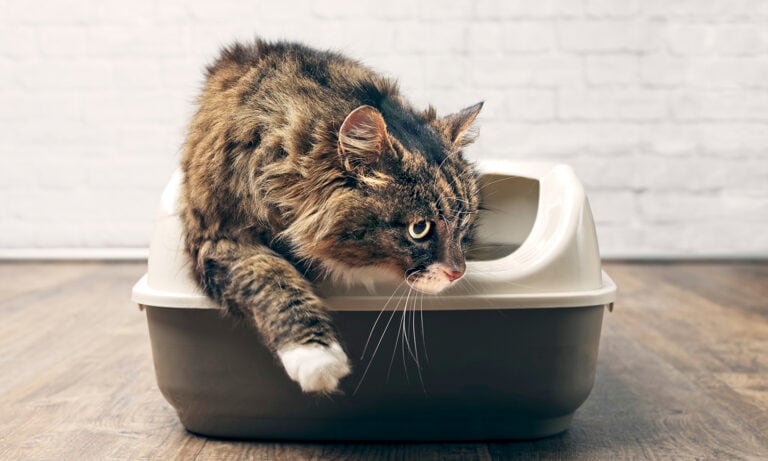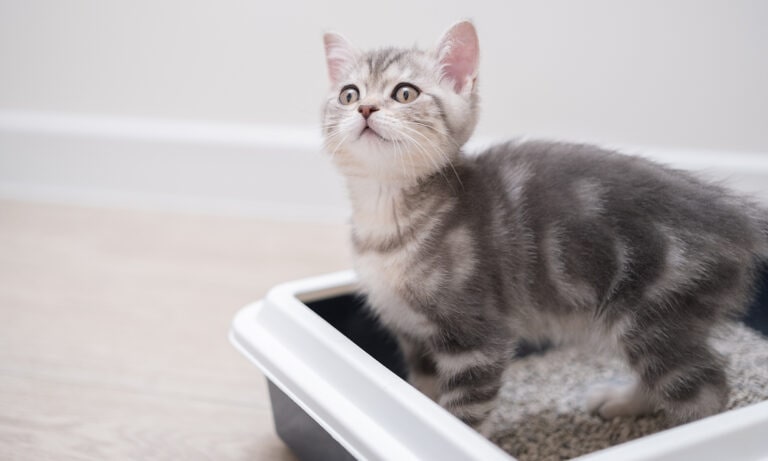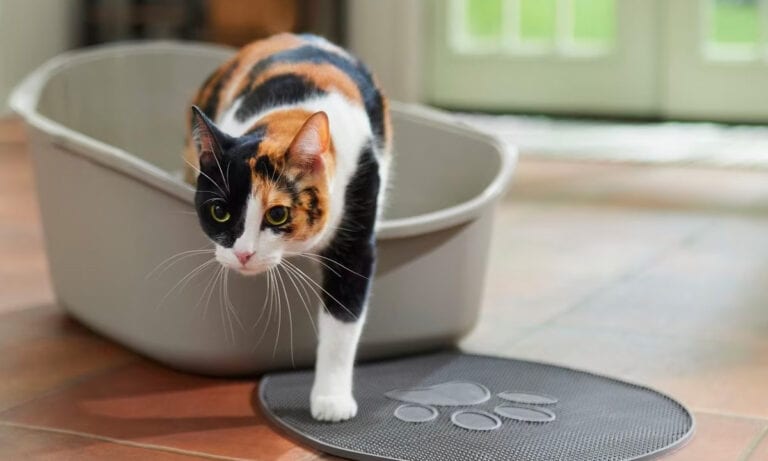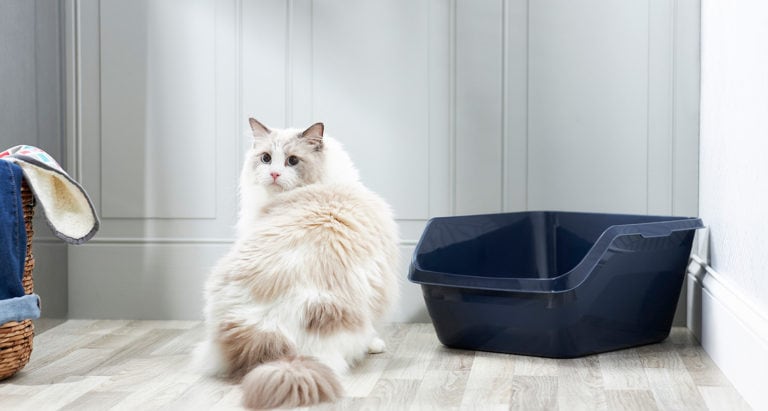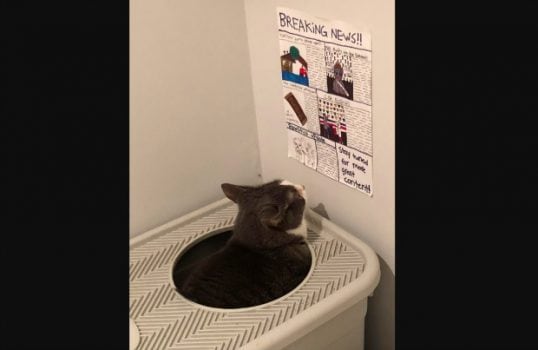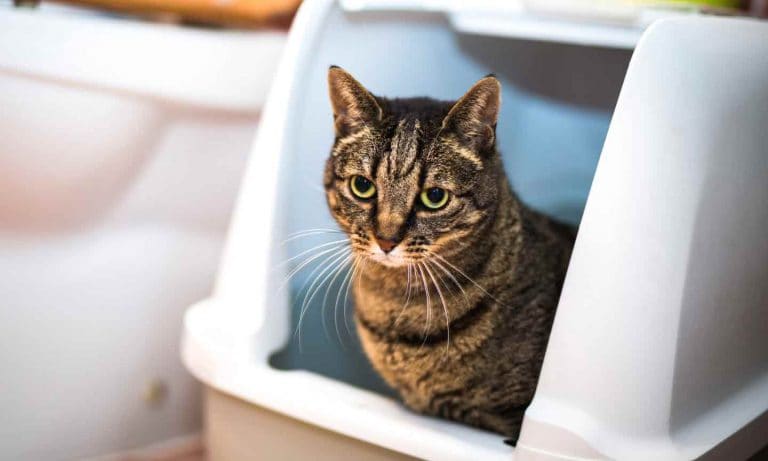If you notice that your kitty is running to the litter box more often or having accidents in places they shouldn’t, you might have a case of cat diarrhea on your hands. Occasional, short-lived diarrhea is normal—every feline, from kittens to senior cats, gets an upset stomach once in a while. But persistent diarrhea is not.
If your cat has diarrhea that won’t go away or is accompanied by other concerning symptoms, like refusal to eat or vocalization, you’ll want to check in with your vet.
We spoke with vet experts about everything you’ve ever wanted to know about your cat’s poop and what you can do to help settle your kitty’s tummy.
Cat Diarrhea
Click to jump to each section.
What Is Cat Diarrhea?
The basic definition of cat diarrhea is loose, unformed stools. But if your cat has diarrhea, you’ll probably notice increased frequency and urgency (i.e., your cat has to go to the bathroom more often and right now) as well as increased volume (there’s more poop in the litter box than usual).
When your cat has diarrhea, it’s also common to find feces in abnormal places (sorry, cat parents), meaning outside of the litter box. Because there is increased urgency, your cat may not be able to make it to the litter box in time. Or, if your cat doesn’t feel well, they may be hiding out and pooping wherever is convenient instead of making their way to the litter box.
Cat Poop Chart
While healthy cats can certainly experience diarrhea from time to time, abnormal poop is one of the first signs of a health issue. Because of this, it’s important to regularly check your cat’s bowel movements, noting both consistency and color.
Cat Poop Consistency: What Does Healthy Poop Look Like?
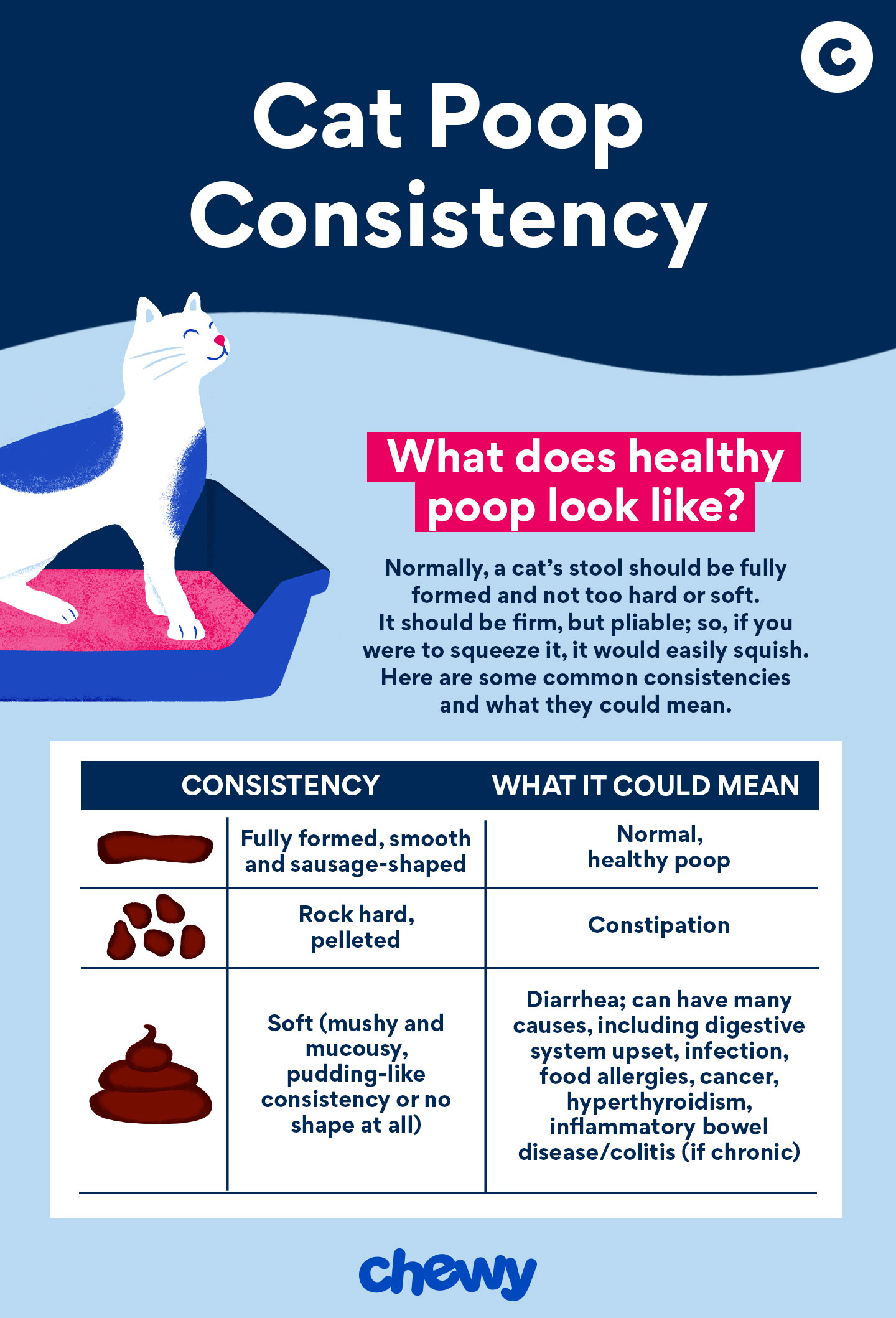
Normally, a cat’s stool should be fully formed and not too hard or soft. It should be firm, but pliable; so, if you were to squeeze it, it would easily squish.
Changes in consistency can signal everything from constipation to pancreatitis, so if you notice any persistent changes in the consistency of your cat’s poop, veterinarian Dr. Amber Carter, DVM, DABVP (Feline Practice), owner of Cat Care Clinic in Ormond Beach, FL, recommends checking in with a veterinarian—and bringing a stool sample with you to the visit for diagnostic testing, if necessary.
Here are some common consistency issues and what they could mean:
Rock hard, pelleted
Constipation
Fully formed, smooth and sausage-shaped
Normal, healthy poop
Pudding-like consistency; somewhat formed, but mushy
Digestive system upset or intestinal tract irritation; ate something that didn’t agree with them
Mushy and mucous-y
Parasites or bowel infection; difficulty digesting fats (issues with pancreas or liver disease possible)
No shape at all
Diarrhea; can have many causes, including infection, food allergies, cancer, hyperthyroidism, inflammatory bowel disease/colitis (if chronic)
Cat Poop Color: What’s Normal?
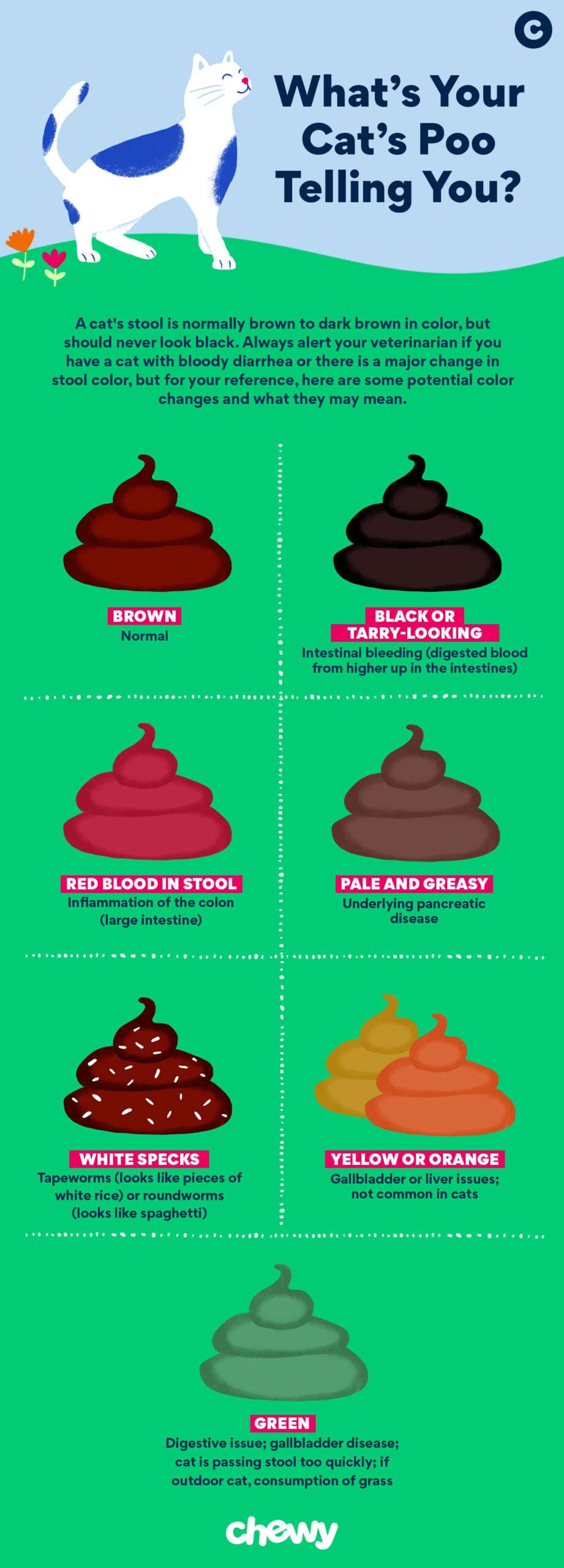
Even if your cat’s poop has the normal consistency, a change in color can be another sign of illness. However, veterinarian Dr. Kelly Diehl, DVM, Senior Director of Science Communication at Morris Animal Foundation based in Denver, Colorado says changes in food can also change your cat’s poop color, so this isn’t always a cause for alarm.
A cat’s stool is normally brown to dark brown in color, but should never look black.
Always alert your veterinarian if you have a cat with bloody diarrhea or there is a major change in stool color, but for your reference, here are some potential color changes and what they mean:
Brown
Normal
Black or tarry-looking
Intestinal bleeding (digested blood from higher up in the intestines)
Red blood in stool
Inflammation of the colon (large intestine)
Pale and greasy
Underlying pancreatic disease
Green
Digestive issue; gallbladder disease; cat is passing stool too quickly; if outdoor cat, consumption of grass
Yellow or orange
Gallbladder or liver issues; not common in cats, according to Diehl
White specks
Tapeworms (looks like pieces of white rice) or roundworms (looks like spaghetti)
Why Does My Cat Have Diarrhea?
There are many possible causes of diarrhea, from a simple change in your cat’s diet to an underlying health condition.
Here are some of the most common possible causes of cat diarrhea:
- New cat food: Cats can be delicate creatures, and many of them have a sensitive stomach. Giving them a new food and/or making dietary changes too quickly can alter their intestinal environment and lead to diarrhea—and other possible symptoms like vomiting and refusal to eat.
- Ingestion of poisonous plants or other toxins: Diarrhea is a common reaction to your cat getting into something they shouldn’t have, like a poisonous plant or some other toxin. If you suspect your cat has ingested poison or toxins, call poison control or seek emergency veterinary care at your local animal hospital.
- Intestinal infections: Viral and bacterial infections (like coccidia) and intestinal parasites (roundworms, hookworms and whipworms) are likely causes of cat diarrhea, especially if your cat hasn’t had adequate deworming.
- Food allergies or food intolerances: Just like humans, cats can be sensitive to certain types of foods. This is common when switching to a new food, but they may also develop an allergy or intolerance to food you’ve been giving them.
- Cancer: Gastrointestinal tract cancers can cause diarrhea, vomiting and blood in the stool. Cancer can also cause chronic inflammatory disease that results in chronic diarrhea, according to Dr. Carter.
- Hyperthyroidism: Weight loss and increased appetite are the most common symptoms of hyperthyroidism in cats, but diarrhea is possible, too.
- Intestinal blockage: A blockage in your cat’s digestive tract can also cause diarrhea, vomiting, refusal to eat, lethargy, weakness and abdominal swelling. Your cat may also struggle to defecate or cry out when attempting to go to the bathroom. This is a medical emergency, so if you suspect an intestinal blockage, take your cat to the emergency vet right away.
- Chronic enteropathy (inflammatory bowel disease): Chronic enteropathy is a fancy name for a gastrointestinal disease that lasts for at least three weeks without any other obvious underlying cause.
- Megacolon: Diehl says megacolon is an often overlooked cause of diarrhea. It develops when a cat is constipated—the large intestine stretches and loses tone, and loose stool can leak around hard feces. This often presents like diarrhea, but it’s really a form of constipation.
When To Go to the Vet About Your Cat’s Diarrhea
A few isolated bouts of diarrhea here and there aren’t usually a cause for concern. So if your cat has diarrhea but seems fine otherwise, you can watch them closely to make sure nothing changes and the loose stools resolve on their own.
However, if your cat has an acute (sudden onset) case of diarrhea that lasts longer than 48 hours, go to the vet for a checkup, Dr. Carter says. And if there are accompanying symptoms, such as your cat acting sick, being lethargic and/or not eating, you should take them sooner.
Your vet will be able to evaluate a stool sample (don’t forget to bring one with you) and run diagnostic testing to figure out what’s going on. This may include blood work, X-rays, ultrasounds and/or an endoscopy or exploratory surgery, depending on the suspected cause.
In addition to testing for a health condition, your vet will be able to diagnose or rule out parasitic, bacterial and viral infections. While some parasites are visible in the stool and quite obvious, many are good at hiding and require fecal testing to diagnose.
Home Remedies for Diarrhea in Cats
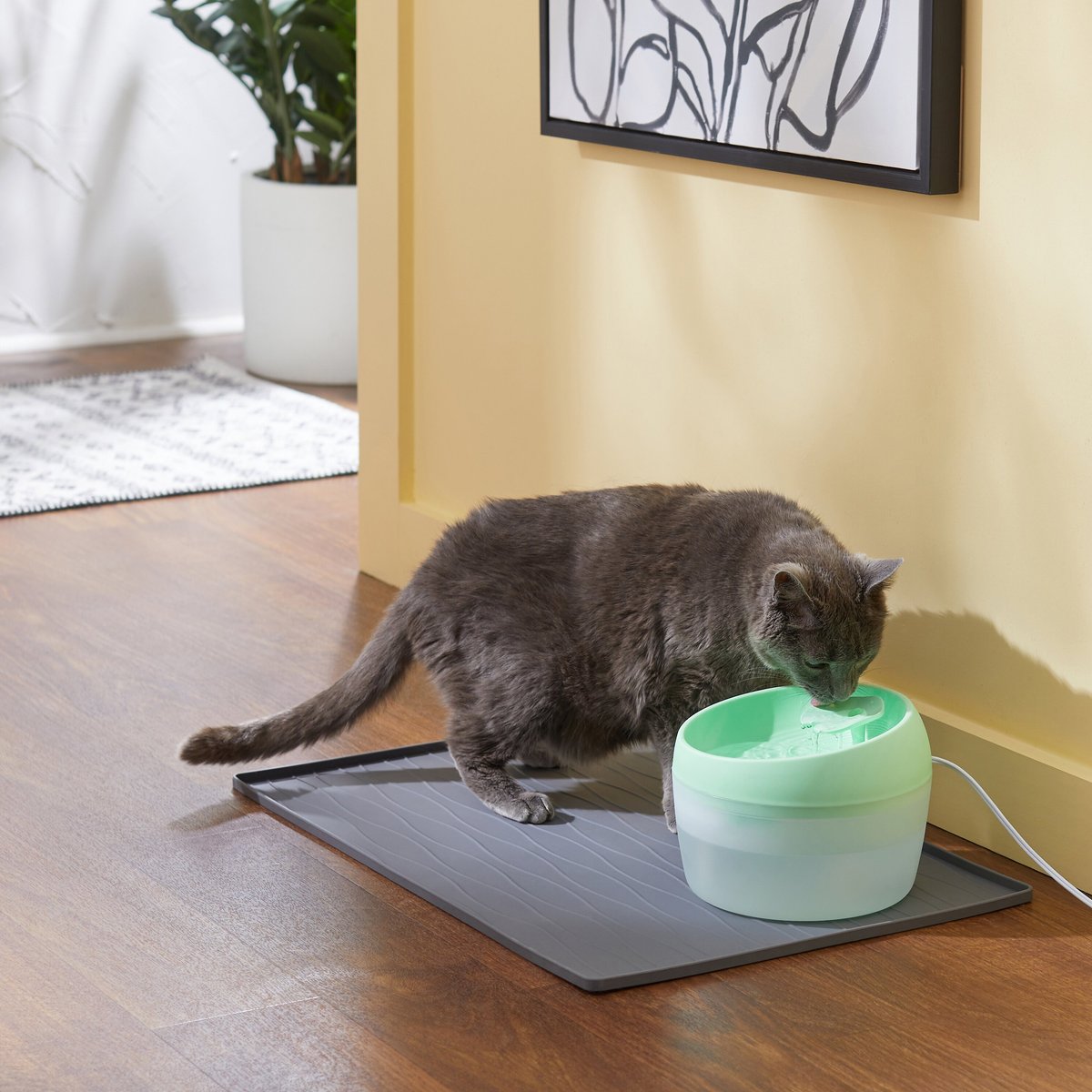
If you’re wondering what to give a cat with diarrhea at home, there are some things you can do to try to alleviate symptoms.
Here are some recommendations, per Dr. Carter:
Stop Feeding Your Cat Treats
Put the treats on hold. Some of the ingredients may be responsible for the diarrhea and stopping them, at least temporarily, can help you pinpoint if they’re the culprit.
You can, however, feed 1 tablespoon or so of plain yogurt with probiotics (if the cat will accept it) or plain canned pumpkin. The good bacteria in plain yogurt benefit the GI tract, while pumpkin has fiber that can help bulk up the stool.
Keep Your Cat Hydrated
When your cat has diarrhea, a lot of fluid is lost, and that fluid contains electrolytes that are critical for normal functioning.
You can mix about 10 to 50 percent unflavored Pedialyte, an over-the-counter electrolyte beverage, in with your cat’s water to replace lost electrolytes.
Another way to get your cat to drink more water is by using a drinking fountain, which constantly rotates the water and makes it more desirable than standing water. Cats love moving water because a) it tastes fresher and b) they’re naturally drawn to moving water sources (like their ancestors!).
Treatment for Cats With Diarrhea
When you have a cat with diarrhea, treatment often starts with figuring out the underlying cause. If it was a diet change, for example, going back to your cat’s original food should be enough to solve the problem (although it may take a day or two for your kitty’s stomach to settle).
But if it’s not that obvious and the diagnostic tests show that something else is going on with your cat’s health, your vet will treat the underlying health condition.
Prebiotics, Probiotics and Antibiotics
Dr. Carter says prebiotics and probiotics are often recommended to help balance a cat’s bacterial microbiome. Antibiotics may also be prescribed to help control bacterial overgrowth. There are also prescription and over-the-counter diarrhea medicines for cats that you can try with the green light from your vet.
Bland Foods and a GI-Specific Diet
“What to feed cats with diarrhea?” is another question pet parents, like you, may ask.
In addition to bland foods, like ground turkey and pumpkin, your veterinarian may recommend a GI-specific diet. It may contain higher amounts of fiber to help bulk up the stool or have specific, limited ingredients, according to Dr. Carter.
Dealing With Chronic Diarrhea in Cats
Chronic diarrhea is generally a sign of illness or food sensitivity. It can also develop in response to prolonged stress and anxiety.
If your cat has persistent diarrhea, the first thing to do is go to the vet ASAP, according to Dr. Carter. A number of tests and trials may need to be performed to get to the bottom of it.
While you and your vet are working together to come up with a solution, Dr. Carter recommends doing the following:
- Keep a log of stool frequency, consistency and color so that you can document changes for your vet.
- Keep the litter box immaculately clean. You don’t want a cat with diarrhea going elsewhere besides the box, which often happens.
- Give all medications as directed by your vet.
- Stock up on cleaning supplies, like Simply Nature’s Miracle Pet Stain & Odor Remover and OxiClean Carpet & Area Rug Dog Pet Stain & Odor Remover, just in case your cat misses the litter box.
More on cat poop:
Share:
